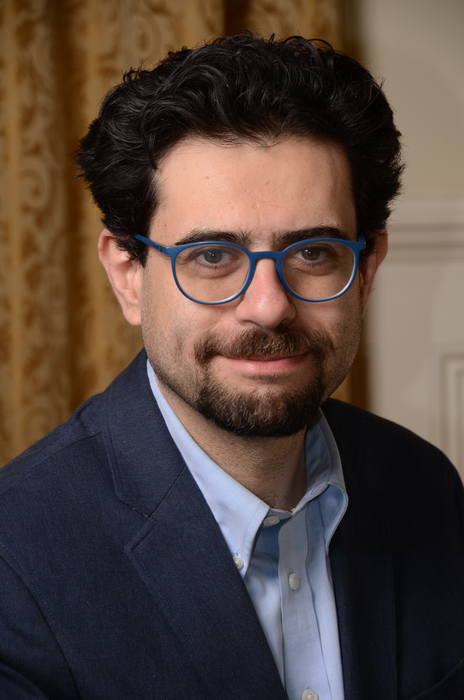PITTSBURGH, April 13, 2023 – In a paper published today in Molecular Psychiatry, a team of scientists from the University of Pittsburgh in collaboration with researchers in Italy described shared patterns of sleep disturbances and irregularities in daily rhythms of rest and activity across patients with schizophrenia spectrum disorder, or SSD.

Credit: University of Pittsburgh
PITTSBURGH, April 13, 2023 – In a paper published today in Molecular Psychiatry, a team of scientists from the University of Pittsburgh in collaboration with researchers in Italy described shared patterns of sleep disturbances and irregularities in daily rhythms of rest and activity across patients with schizophrenia spectrum disorder, or SSD.
By using wrist monitors that measured activity and rest as proxies of wakefulness and sleep, researchers found that individuals with SSD who resided in psychiatric hospitals and those who manage their condition in outpatient settings had erratic sleep patterns, dysregulated transitions between sleep and wake cycles, and excessively rigid daily routines that were predictive of worse SSD symptoms and correlated with poorer quality of life.
“Regulating sleep and wake cycles is important for your overall health and our findings can also be extended to people without underlying mental health conditions,” said associate professor of psychiatry and senior author of the study Fabio Ferrarelli, M.D., Ph.D. “Most people can benefit from better sleep hygiene and paying attention to their daily routines by incorporating activity and variety in their daily lives.”
Effects of disrupted sleep have long been studied in the context of physical and mental health, and well-established research literature suggests that people suffering from SSD have trouble falling asleep and get poorer rest than people without underlying mental health conditions.
In addition, sedative medications that are used to manage SSD symptoms are known to alter sleep and extend the time that patients spend resting up to 15 hours per day. Too much sleep can have negative consequences on patients’ SSD symptoms, says Ferrarelli.
“It’s important to be mindful of how drugs that we prescribe to patients affect their health more broadly,” he said. “Our study shows that a 12- to 15-hour sleep can be harmful, and it’s important to avoid overprescribing sedatives and use the lowest dose possible.”
In the study of 250 participants, including almost 150 residential and outpatient SSD patients representing one of the largest cohorts among published studies on sleep and SSD, the researchers measured participants’ activity and rest throughout the day and night by asking them to wear a wristband that detects movement and acceleration.
The scientists did not track brain waves during sleep or distinguish between different phases of sleep – such as fast sleep and deep sleep – something that they plan on doing in future studies. Still, the results were strong and consistent.
They found that both residential and outpatient SSD individuals tended to have fewer active hours during the day and spent more time sleeping or passively resting than healthy controls.
In addition, residential patients had more fragmented sleep and more abrupt transitions between rest and activity compared to the outpatient group. Residential patients also displayed more rigid rhythms of daily rest and activity than outpatients, and those measures correlated with a greater degree of negative mental health symptoms, including reduced motivation to interact with others and blunted capacity for feeling pleasure.
“The consistency between the two patient cohorts was somewhat surprising to us,” Ferrarelli said. “But, interestingly, we found that residential patients had much more stable daily routines. We tend to think of stable routines as a good thing, but when these routines become too rigid, they can present a problem. In our study, this rigidity in daily rhythms was strongly correlated to the severity of negative mental health symptoms in residential patients with schizophrenia.”
The researchers say that it is not possible to use markers of disrupted sleep to diagnose SSD because of the symptoms’ overlap with other mental health conditions, such as dementia. But varying your daily routines and incorporating movement into your life are two simple steps that everyone can take to improve and protect their brain health.
“Especially as people get older, we tend to get deep into our routines,” said Ferrarelli. “Routines provide a sense of control to our lives and can be very beneficial. But if a routine is too rigid, it can backfire. Keeping your sleep schedule consistent while mixing up your daily tasks and splitting them across different days of the week is a good way to add variety to your schedule and improve your health long-term.”
Additional authors of the study include Ahmad Mayeli, Ph.D., Alice LaGoy, Ph.D., Stephen Smagula, Ph.D., James Wilson, Ph.D., all of Pitt as well as Giovanni de Girolamo, Ph.D., and the DIAPASON consortium from Italy.
This research was supported by the National Institute of Mental Health with the grant number R01 MH113827.
Journal
Molecular Psychiatry
DOI
10.1038/s41380-023-02050-x
Article Title
Shared and distinct abnormalities in sleep-wake patterns and their relationship with the negative symptoms of Schizophrenia Spectrum Disorder patients
Article Publication Date
13-Apr-2023




